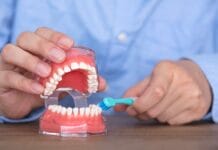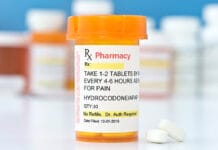Marisa’s Story
In the blink of an eye, your life can change. On August 5th, the day after my husband David’s 29th birthday, as a recovery worker/tow truck operator, he was called out at 4:30 am to the interstate to recover a rolled over vehicle. While David was on the scene, he was struck by a tractor-trailer. He sustained a severe spinal cord injury. David was an organ donor. His prognosis was poor, his health declined rapidly, and after 48 hours he showed no signs of improvement. On August 8, 2016, David was taken off life support. The surgical team was able to preserve his liver, kidneys, and his corneas for donations. Having previous experience with stress, depression, and anxiety, the tragic loss of my husband caused these feelings to begin to resurface.
Grieving can cause the immune system to be compromised. Individuals who are grieving may need changes in their current medications or might need medications to help lessen feelings of stress, depression, and anxiety. There are several medications that are prescribed to help control and reduce feelings such as depression, anxiety, decreased or increased appetite, and overwhelming amounts of stress that comes with grief. However, medications may come with side effects. Common side effects are xerostomia, hyposalivation, oral or dental pain, mouth and gingival infections, trouble eating and speaking, sore throat, or acid reflux.1
Medications for Stress, Depression, and Anxiety
Buspirone is a medication for anxiety (anxiolytic) that works by affecting certain natural substances in the brain (neurotransmitters). It may help an individual think more clearly, relax, worry less, and take part in everyday life. It may also help an individual to feel less jittery and irritable and may control symptoms like trouble sleeping, sweating, and pounding heartbeat. Side effects such as headaches and nausea causing vomiting may lead to acid erosion.2 Neutralizing the pH in the mouth by holding water in the mouth for 1-2 minutes then either swallowing the water or spitting it out could help halt the erosion process. Waiting to brush after vomiting for 20-30 minutes can also help decrease the risk of tooth erosion.
Mirtazapine is an antidepressant that works by restoring the balance of neurotransmitters in the brain. Side effects include xerostomia and increased appetite.3 Frequent snacking, or grazing all day, on sugary drinks or carbohydrate-filled foods can result in an increased risk of decay.4
Bupropion may work by helping to restore the balance of neurotransmitters in the brain. This medication is used to treat depression. It can improve a person’s mood and feelings of well-being. Side effects such as nausea and vomiting, causing acid erosion and dry mouth, can result in increased decay. Headaches, causing tension, can result in bruxism, as well as jaw pain. Bruxism can contribute to abfraction, attrition, and fractured teeth and/or roots.5 Fractured teeth and roots can cause severe pain, and perhaps, infection. A night guard can help for nighttime bruxism. For those with severe bruxism, Botox might be a helpful treatment.6 Other ways to release stress can be some form of exercise, a warm bath before bed, or massage therapy.
Alprazolam belongs to a class of medications called benzodiazepines, which act on the central nervous system to produce a calming effect. It works by enhancing the effects of GABA, the major inhibitory amino acid neurotransmitter in the brain. It is prescribed to treat anxiety and panic disorders. A side effect that may contribute to oral complications is decreased saliva production.7 There are many ways to treat dry mouth symptoms. Staying well-hydrated by drinking 6-8 cups of water daily is a simple and effective way to treat this. Alcoholic and caffeinated beverages should be avoided or minimized as they cause dehydration. The use of sugar-free or xylitol-containing gum and hard candy helps stimulate the salivary glands to produce more saliva.8 There are a plethora of products to relieve xerostomia symptoms, just make sure the products you recommend do not have an acidic pH.
Sertraline is a selective serotonin reuptake inhibitor (SSRI). It works by helping restore the balance of a certain natural substance like serotonin in the brain. Zoloft is usually prescribed to help treat depression and post-traumatic stress disorder. This medication may improve and individual’s mood, sleep, appetite, energy level, and may help restore the interest in daily living. It may decrease fear, anxiety, and unwanted thoughts. Side effects which can cause oral complications include xerostomia, which may lead to an increased risk of decay; loss of appetite, resulting in decreased saliva production when mastication is not active; and upset stomach, causing vomiting, possibly leading to acid erosion.9 To help aid in decreasing the acid attacks that may occur, staying hydrated with water to neutralize the pH in your mouth is recommended.
Dental practitioners who encounter patients who take these medications may find it, not only extremely difficult but almost impossible at times, due to the differentiated symptomology these conditions exhibit.11 With being prescribed several medications, and most having side effects that affect oral health, it is important for individuals to make sure they are discussing this with their primary care practitioners, as well as, their dentist/dental hygienist.
It is important to update the patient’s list of medications, as well as medical history at every re-care, emergency, or restorative treatment appointment. As dental hygienists, the most important thing we can do is to educate our patients and help them with home care options to help them reach optimal oral health by reducing the manifestations of these side effects.
Kate’s Story
At a young age, I was diagnosed with idiopathic cirrhosis of the liver. I was about 16 years old when a liver transplant was first mentioned. At the age of 26, this topic resurfaced when a routine scan came back with potentially cancerous findings. With this information, listing for a liver transplant was strongly suggested by a team of doctors. After two years of constantly increasing my MELD score, this stands for Model for End-Stage Liver Disease, a method of allocating livers for donation, I began to receive calls about possible donors.
On November 16th, I received the call that has changed the lives of my entire family. I had to report at my transplant center at 9 am for testing; after initial bloodwork and lots of waiting it was time for my surgery around 5 pm. The surgery lasted about 6 hours, and all initially went well. The next morning my doctors and nurses had me up and walking. While in the hospital I experienced several complications that extended my “4 days” to 17, including a serious battle with initial rejection. In looking back, that was the easy part.
I was sent home with a list of medications that would make anyone’s head spin. With 12 medications taken up to 4 times per day, I was taking almost 50 pills daily, including steroids, antirejection, antibiotics, antivirals, antifungals; if there was a class of drug, I was on it. All these medications didn’t come without side effects.
As hygienists, we are given a unique opportunity to give recommendations to help reduce the number of side effects a patient might present with due to medications, and provide guidance to lessen or prevent these side effects from occurring entirely. The listed side effects from these medications are extensive and range in severity. When speaking with other transplant recipients, the number of unexpected side effects was even greater.
Immunosuppressants
A patient who has undergone organ transplant is going to be on some sort of immunosuppressant, more than likely for the rest of their lives. Immunosuppressants are generally affecting our patients’ blood. They can also increase your patient’s risk of infection.12 Meaning oral diseases may become rampant due to the inability of the body to fight bacteria.
With this risk factor, patients who have active periodontitis may require more frequent visits, as well as a very detailed homecare regimen, in order to arrest disease progression.13 This increased risk of infection does not increase your patients’ risk of bacteremia. It is always best to provide collaborative treatment with a patient’s physician if you feel unsure of treating a patient post-transplant. All elective dental work should be done a minimum of 3-6 months after the initial transplant. Emergency work can be done; however, it is imperative that a patient’s physician is contacted about possible contraindications.14
Along with an increased risk of infection, there is also a delayed response in wound healing.15 Due to a weakened immune response, the patient may not recover as quickly as expected following dental treatment. When performing debridement, a patient on immunosuppressant medication may exhibit increased gingival bleeding.15 This may mean multiple follow-ups checking for healing after periodontal therapy, giving proper homecare recommendations and aides to encourage healing, and in some cases, delaying treatment until a later date.
If a patient exhibits gingival bleeding or painful gingiva as a side effect, there are some steps we as hygienists can take to help. First, eliminate factors that can increase the bleeding; frequent hygiene appointments, as well as a manageable, but thorough, homecare routine can diminish the factors contributing to the bleeding. Modification to their brushing method or type of toothbrush may be needed due to pain and inflammation. Some patients will be in too much pain to brush; it is important that we give them options of what to do in case this happens. Recommending the Charter’s method as an alternative can eliminate bacteria, yet be kind to the gingiva, allowing it to heal properly. Gingival tenderness and bleeding will diminish over time.13
A side effect of immunosuppressant therapy that doesn’t directly affect the patient’s mouth is handshaking and numbness. Popular immunosuppressants can cause these tremors. They may range in severity from very minor to greatly impacting the quality of life. This may make the patients normal home care regimen difficult.15 Over-the-counter home care products, such as floss picks and holders and electric toothbrushes, help allow a patient with these tremors to achieve adequate homecare.
Besides the aforementioned side effects, gingival overgrowth can also occur due to immunosuppressant therapy.12 Gingival overgrowth can complicate homecare and make plaque removal difficult. A tailored homecare routine is imperative to keeping the oral cavity in its healthiest state. In severe cases, a gingivectomy or gingival re-contouring may need to occur.13
Some of the names of immunosuppressant medications are tacrolimus, cyclosporine, sirolimus, mycophenolate mofetil, mycophenolate sodium, and azathioprine. Many more immunosuppressant medications exist, and the list is constantly being updated.
Steroids
Prednisone is the most commonly prescribed steroid for transplant patients. Steroid use affects everyone slightly different. Long-term steroid use can cause multiple oral complications which affect dental treatment. Increased bleeding and wound healing are two of the main side effects of oral steroid use.16 These side effects can affect visibility for the clinician and recovery when performing non-surgical periodontal therapy/SRP.
Another side effect of steroid use is high blood pressure. Checking a patient’s blood pressure is a very easy and fast step that can greatly impact our patients’ lives. It is a lifesaving step hygienists can take to ensure our patients’ overall health is being monitored and treated.
Antibiotics
High and long-term doses of antibiotics can cause multiple side effects. The most common being stomach upset and increased vomiting. With any patient who vomits frequently, the risk for erosion is present. If a patient presents with signs of erosion, addressing and giving homecare recommendations on how to prevent further damage, such as increased fluoride usage, is an important step to give to patients.13
Antibiotic treatment also is known to cause other oral manifestations, such as halitosis and stomatitis.17 These conditions will subside once antibiotic treatment is reduced or discontinued. Lastly, antibiotics are known to cause issues of the tongue. Hairy tongue and acute glossitis are known to occur. With hairy tongue, talking to your patient about proper tongue cleaning using an adjunct aide, the importance of having good oral hygiene, and eventual discontinuation of the medication may resolve the issue.
Making patients aware of the habits that may be exacerbating the condition, such as smoking, excessive alcohol use, some drugs, and dark-colored liquids and foods can affect the color of the tongue, is helpful. If these steps do not reduce the hairy tongue, resources to aid in the treatment of hairy tongue include prescription antifungal medicines, over-the-counter antiseptic mouthwash, and in extreme cases surgical treatment of the papilla.17
Antifungals
Another type of medication that a transplant recipient may be on is antifungals. Antifungals are known to cause hypersensitivity. Hypersensitivity can be treated with various over the counter products, increased fluoride exposure, and usage. In some more severe cases, prescription pastes and rinses may be needed to help diminish tooth sensitivity.
Another side effect of antifungals is dyspnea; with this labored breathing, there may need to be modifications to patient treatment. As clinicians, we should avoid using ultrasonic scalers and air polishers on these patients. It is also possible these patients may ask to be seated upright, in order to breathe properly.17 It is recommended that if you are unsure of the classification of a medication that further research is done on the category.
Antivirals
The last category of medications commonly prescribed to transplant patients are antivirals. These medications are prescribed to try to prevent Cytomegalovirus, which is a potentially fatal virus to those who are immunocompromised.17 Side effects of these medications vary from ulcers to edema, and taste aversion. Patients who are experiencing these medications should be advised in methods of controlling the oral manifestations. Edema of the face or gingiva could leave patients with increased bleeding, pain upon provocation or difficulty opening. The edema should clear up shortly after discontinuing the medication. 13
As dental professionals, it is our duty to be aware of the possible side effects of medications our patients may take. If a patient is experiencing oral manifestations from medication, we should be trying to work with them to restore their oral health to the best achievable condition.
References
- Mission Pharmacal Company. (2018). Aquoral Complications. Retrieved from https://www.aquoral.com/complications
- First Databank, Inc. (2018). Buspirone Oral: Uses, Interactions, Pictures, Warnings & Dosages. WebMD. Retrieved from https://www.webmd.com/drugs/2/drug-8876/buspirone-oral/details
- First Databank, Inc. (2018). Remeron Oral: Uses, Interactions, Pictures, Warnings & Dosages. WebMD. Retrieved from https://www.webmd.com/drugs/2/drug-13707/remeron-oral/details
- Johnson, D.J. (2013). Sip and Snack All Day? Risk Decay! ADA Patent Smart Patient Education Center. Retrieved from https://www.ada.org/~/media/ADA/Publications/Files/ADA_PatientSmart_Sipping_Snacking.pdf?la=en
- First Databank, Inc. (2018). Wellbutrin Oral: Uses, Side effects Interactions, Pictures, Warnings & Dosages. WebMD. Retrieved from https://www.webmd.com/drugs/2/drug-13509/wellbutrin-oral/details
- Bruxism. (2018). Mayo Foundation for Medical Education & Research. Retrieved from https://www.mayoclinic.org/diseases-conditions/bruxism/symptoms-causes/syc-20356095
- First Databank, Inc. (2018). Xanax Oral: Uses, Side effects Interactions, Pictures, Warnings & Dosages. WebMD. Retrieved from https://www.webmd.com/drugs/2/drug-9824/xanax-oral/details
- Farber, D. (2014). Xerostomia and Hyposalivation (“dry mouth”). Dana-Farber/Brigham and Women’s Cancer Center. Retrieved from https://www.dana-farber.org/legacy/uploadedFiles/Library/adult-care/treatment-and-support/centers-and-programs/oral-medicine-and-dentistry/xerostomia-and-hyposalivation-teaching-sheet.pdf
- First Databank, Inc. (2018). Zoloft Oral: Uses, Side effects Interactions, Pictures, Warnings & Dosage. WebMD. Retrieved from https://www.webmd.com/drugs/2/drug-35-8095/zoloft-oral/sertraline-oral/details
- Levine, J.B. (2018). What is Saliva and why is it Important. Retrieved from The Oz Blog: http://blog.doctoroz.com/oz-experts/what-is-saliva-and-why-is-it-so-important
- Shapira, D.E. (2013, July). Grief and Loss: How these Entities Affect Dental Treatment, Especially After the Age of 65. Dental Academy of CE. Retrieved from https://www.dentalacademyofce.com/courses/2494/PDF/1307cei_shapira_web.pdf
- Cyclosporine. (2017). United Network for Organ Sharing. Retrieved from https://transplantliving.org/after-the-%20transplant/preventing-rejection/post-transplant-medications/cyclosporine/
- Wilkins, E.M. (2017). Clinical Practice of the Dental Hygienist. (12th ed). Philadelphia, PA: Lipincott, Williams and Wilkins.
- Dental Management of the Organ Transplant Patient. (2011). National Institute Dental and Cranial Research. Retrieved from https://www.in.gov/isdh/files/OrganTransplantProf.pdf
- Tacrolimus. (2017) United Network for organ sharing. Retrieved from https://transplantliving.org/after-the-transplant/preventing-rejection/post-transplant-medications/tacrolimus/
- Wick, J. (2013). Chronic Corticosteroids can impair Post Op Wound Healing. Retrieved from http://www.mdmag.com/medical-news/chronic-corticosteroids-can-impair-post-op-wound-healing
- Haveles, E. B. (2016). Applied pharmacology for the dental hygienist (6th ed.). St. Louis, Mo: Mosby Elsevier.
- Ahmed, A. (October 2011). Antiviral treatment of cytomegalovirus infection. Retrieved from www.ncbi.nlm.nih.gov/pubmed/21827432












